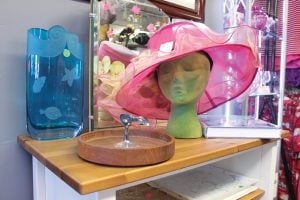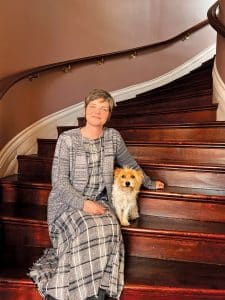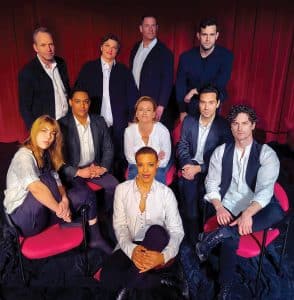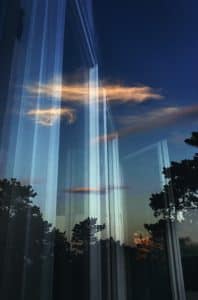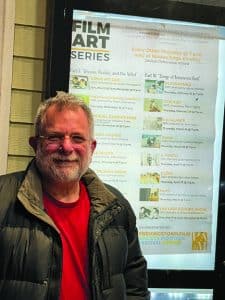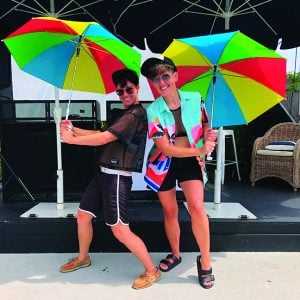by Rebecca M. Alvin
Top Image: Die-Cast director Brenna Geffers.
Photo: Josh Andrus
When you enter the Wharf House, you enter a theatrical world already in progress. Well, actually, it’s five distinct worlds with five distinct main characters in five different periods of time. You are free to gravitate toward whichever timeline/character appeals to you. Your perception of the play, for lack of a better word, is based on the choices and perhaps unconscious instincts that draw you to one world over another in a particular order unique to you. Each option is distinct, but all five characters are connected in their unfortunate condition of being about to die. They are about to share their last moments with you and with each other, despite their disconnected time periods. Everything exists in these moments.
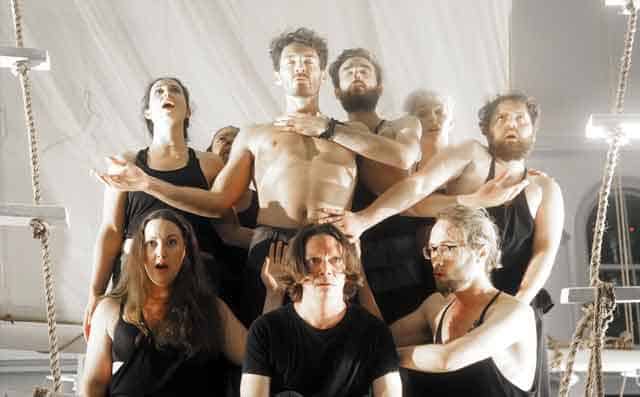
Brenna Geffers is the founder of Die-Cast Ensemble, a Philadelphia-based theater collective that creates site-specific theatrical pieces that create unique experiences for audiences. As a director, Geffers directed the EgoPo Classic Theater production of Eugene O’Neill’s The Hairy Ape at the Wharf House for the 2016 Provincetown Tennessee Williams Theater Festival. She returned to direct the newly created Die-Cast Ensemble’s production of Shakespeare’s Pericles aboard the Rose Dorothea ship that sits on the second floor of the Provincetown Public Library in 2017. Now, she’s at the helm of two productions for the 2018 festival, including this experience at the Wharf House, Menagerie of Angels, which is a kind of a work-in-progress, interactive, immersive theater piece based on characters and imagery from Tennessee Williams’ writings. She describes it as “Sort of like what happens when you look at a space, and imagine all the things that might have happened in it at the same time, that’s kind of what we’re playing with. And so their stories start to sort of overlap and they become more aware of each other, less aware of each other and in what way they’re connected, even though they never met and they could never have met. I kind of describe it as an impossible love story.”

The audience’s role is key here; we all have the ability to “kind of zoom in to the character, or … stay a little bit more zoomed out and sort of watch the whole picture unfolding,” according to Geffers. In time, the characters repeat their narratives, so audiences can go from character to character if they like, as well.
This isn’t the kind of theater that unfolds before you as you sit back in your chair and observe the cast performing their lines. While that kind of experience has been around for centuries and continues to be a valuable form of entertainment, in recent decades, there has been a push in a variety of art forms for a more immersive experience, one that doesn’t allow you to be passive, but rather invites you to craft your own understanding of the work as an individual. Creating such a work has to have a kind of openness to it, a letting go of control on the part of the writer. For Menagerie of Angels, which does not have a single writer credited as the playwright, Geffers describes the writing process as a collaborative one of building characters and weaving them together, integrating the space into the piece. This last part is important because it is part of Die-Cast’s mission to create work for specific spaces and to allow those spaces to be elements of the work, in and of themselves.
“[In theater], we tend to take a lot of care with the way the actors interact with the audiences, but sometimes we try to negate the very thing, the very space that the audience is in. We treat the black box theater as sort of the default television screen or frame around a piece of art and ask it to be neutral, which is really great. That can be a really wonderful experience. However, with Die-Cast, we try to think of the space as being as an essential aspect of the work as the actors, as the actual text, because it is in some way the first thing that the audience interacts with,” she explains. “We want the audience to feel inside of the world of the piece rather than outside watching it.”
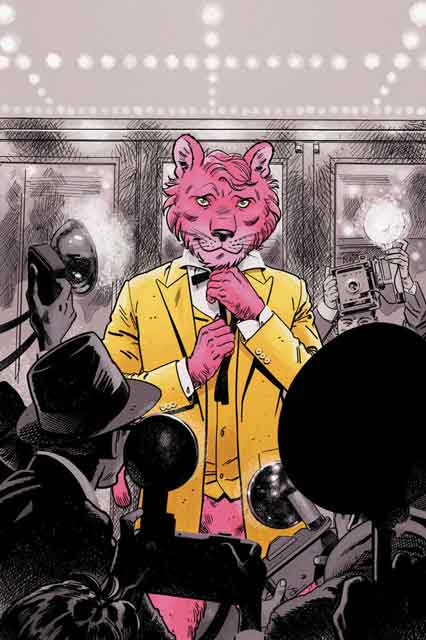
In addition to their experience doing Pericles, she also cites other examples the group has produced, such as one done in an abandoned nightclub in Philadelphia and another set in Prohibition times, created specifically to be performed in “the old political halls of Upstate New York.” In all of these cases, the place itself comes first and the play is built around it. For Menagerie, Geffers and her actors worked together to build the piece from the characters out, using methods of theatrical devising.
“I said to the gentlemen who are in this show this time, ‘okay, well if your character lived in a time period, what time period would it live in?’ I asked them, ‘if your character was going to die, what would it die of? If your character was an occupation, what might be their occupation?’ So it’s sort of like a Buzzfeed quiz,” she explains. As the actors built their characters thinking about these questions and imagining why their characters would be in the Wharf House in Provincetown, Geffers spent her energies looking through books about Williams, his plays, and his letters. “I’m looking for images that sort of resonate with me, images of certain ways he talks about the quality of light, or the ideas— he talks about flowers a lot, colors, or just making sort of a living document of images that I feel are echoing inside of his work,” she explains. Then she and the actors met and began to craft the piece, melding together the images and characters into the performance space to create the piece. “And we’ll finish it in Provincetown, because this is the first draft. So it’s not a ‘production’ in that way; there are aspects of it that we are actually currently building. It’s very exciting,” she adds.
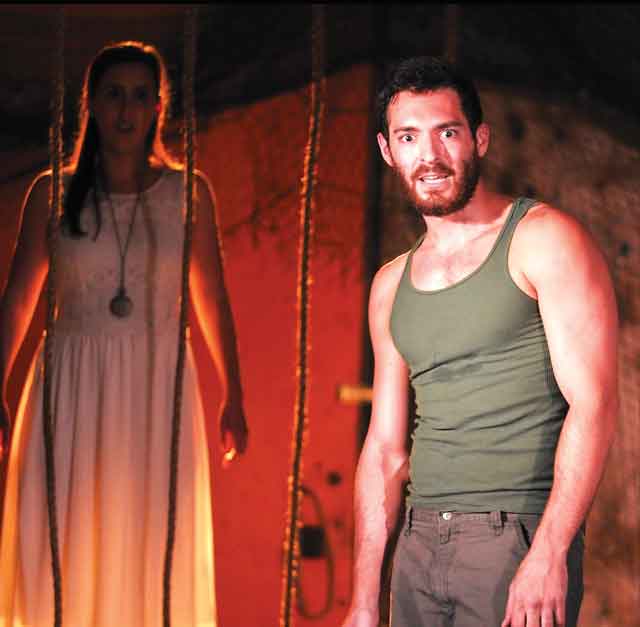
In addition to this piece, Geffers is also directing a staged reading of The Snagglepuss Chronicles, a new play based on the groundbreaking DC comic book written by Mark Russell and drawn by Mike Feehan that reenvisions the Hanna-Barbera cartoon character Snagglepuss as a successful Broadway playwright in the 1950s (a la Tennessee Williams) who is brought before the House Un-American Activities Committee to testify about activities deemed un-American, including homosexuality. The reading has its own challenges as it is tasked with bringing strongly visual work (as comic books are) to the inherently non-visual format of a reading. But Geffers sees this as “a really wonderful puzzle” she’s eager to take on. “Comics, a beautiful thing about them is they’ll show you one image and give you the text from a completely different world. So it’s playing with the juxtaposition of ‘I’m listening to this character talk about this while my eye is seeing this on the page.’ So we’re trying to experiment a little bit with basically I would call him a narrator role… what you might be hearing in your head while you read a comic. So that’s a lot of fun, but we’ll see if it works,” she laughs.
Tennessee Williams has long been heralded for being a playwright ahead of his time, but now, 35 years after his death, one wonders how he would have felt about immersive theater productions, audience-directed interactivity, and the overall openness of these types of theater pieces. Geffers muses, “When I think of Tennessee Williams’ work, one of the things that for me resonates is the way that he sort of excavates the human soul in terms of grief and loneliness and longing and corruptibility. And so, this work, this style of work in some ways puts the onus on the audience to help excavate that with the story rather than when Williams presents it to us so delicately, you almost don’t want to put your fingers on it.”
Die-Cast Ensemble will perform Menagerie of Angels at the Wharf House at Provincetown Marina, 9 Ryder Street Ext., on Friday, September 28, 10 p.m. and Saturday, September 29, 6:30 p.m. The staged reading of The Snagglepuss Chronicles will be conducted at Fishermen Hall, 12 Winslow St., on Sunday, September 30, 11 a.m. Tickets ($45 for each) and information are available at the Provincetown Tennessee Williams Theater Festival box office at 331 Commercial St. (during the festival only), or in advance, by calling 866.789.TENN (8366) Ext. 1, or online at twptown.org. Tickets are NOT available at the door.

